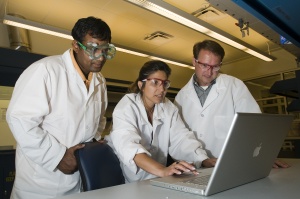Jul 16 2009
An Indiana medical-device company has signed a research agreement through the Purdue Research Foundation to use laboratories and equipment at Purdue University's Birck Nanotechnology Center, officials announced.
 Ganesh Balasundaram, principal scientist at Nanovis LLC (from left), Monica M.C. Allain, managing director for Purdue's Birck Nanotechnology Center in Discovery Park, and Matt Hedrick, president and chief operating officer at Nanovis, discuss research related to spine repair using nanostructured biomaterials in a laboratory at Birck. Nanovis, which is based at the Purdue Research Park and collaborating with Birck, has begun initial testing of a bone regeneration technology with the help of a $2 million grant from the state's 21st Century Research and Technology Fund. The technology was jointly discovered by Nanovis and researchers at Purdue and Brown University. (Purdue University photo/Mark Simons)
Ganesh Balasundaram, principal scientist at Nanovis LLC (from left), Monica M.C. Allain, managing director for Purdue's Birck Nanotechnology Center in Discovery Park, and Matt Hedrick, president and chief operating officer at Nanovis, discuss research related to spine repair using nanostructured biomaterials in a laboratory at Birck. Nanovis, which is based at the Purdue Research Park and collaborating with Birck, has begun initial testing of a bone regeneration technology with the help of a $2 million grant from the state's 21st Century Research and Technology Fund. The technology was jointly discovered by Nanovis and researchers at Purdue and Brown University. (Purdue University photo/Mark Simons)
Nanovis Inc., a Columbia City, Ind.-based company with offices at the Purdue Research Park in West Lafayette, will work with Birck researchers and the center's facilities to improve the interactive process between medical implants and human tissues for reducing rejection or infection.
"This industry partnership opens the door at the Birck Nanotechnology Center for enhanced opportunities for joint research with industry partners," said Timothy Sands, the Mary Jo and Robert L. Kirk Director of the Birck Nanotechnology Center.
Nanovis, which was launched in 2006 in the Purdue Research Park from technology developed at Purdue, is commercializing a portfolio of nanostructured surfaces, materials and proprietary medical devices that better manage the interface with bone, soft tissue, nerves and cardiovascular cells. Thomas Webster, who was an associate professor of biomedical engineering at Purdue and is now a researcher at Brown University, discovered the technique.
"Through this collaboration, Nanovis will have access to some of the most advanced nanotechnology research facilities on a university campus in the world, with access to the expertise of the university's research community," said Matt Hedrick, Nanovis' president and chief operating officer. "Nanovis also will get to know many of Purdue's high-caliber graduate students who work with nanotechnology."
Nanovis is using nanotechnology facilities at Purdue to create products that can assist in procedures from knee and hip implants to improved stents and treatments to help prevent spinal fractures, Hedrick said. The company is developing and marketing nanotechnology that, when added to a knee or other implant surface, will help the body grow around the device instead of fighting it.
Hedrick, who previously worked with a startup company in Maryland, said Indiana is creating an environment to launch such life-sciences ventures.
"I think a lot of the pieces are in place, even during the current tough economic climate, to advance Indiana's storied strength in the life sciences," said Hedrick, crediting the state's agencies, lawmakers, organizations and universities with supporting new life-sciences ventures.
Assisting in the agreement were Joseph B. Hornett, senior vice president, treasurer and chief operating officer of the Purdue Research Foundation, which manages the Purdue Research Park; and Monica M.C. Allain, managing director of the Birck Nanotechnology Center.
The 187,000-square-foot Birck Nanotechnology Center, a cornerstone facility in Discovery Park that became fully operational in October 2005, involves more than 300 Purdue faculty members, researchers, staff and graduate students from 27 schools and departments. Birck opened its $10 million cleanroom, the Scifres Nanofabrication Laboratory, to researchers in June 2006.
The facility is named for Michael and Katherine (Kay) Birck of Hinsdale, Ill., who contributed $30 million for the building. Michael Birck is a Purdue alumnus, member of the Purdue board of trustees and chairman of Naperville, Ill.-based Tellabs Inc.
Alumni William B. and Mary Jane Elmore provided $2 million toward the center's William and Mary Jane Elmore Advanced Concept Validation Laboratory.